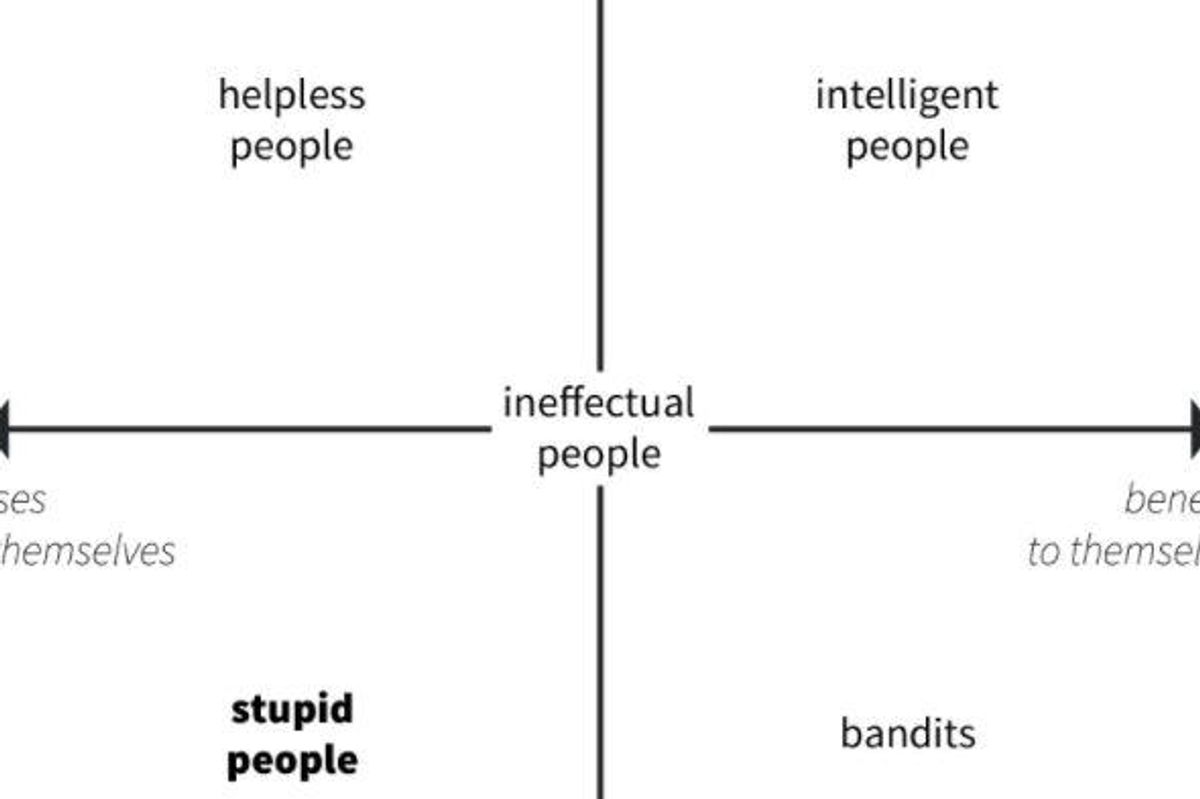
Have you ever known someone who was educated, well-spoken, and curious, but had a real knack for making terrible decisions and bringing others down with them? These people are perplexing because we’re trained to see them as intelligent, but their lives are a total mess.
On the other hand, have you ever met someone who may not have a formal education or be the best with words, but they live wisely and their actions uplift themselves and others?
In 1976, Italian economist Carlo Cipolla wrote a tongue-and-cheek essay called “The Basic Laws of Human Stupidity” that provides a great framework for judging someone’s real intelligence. Now, the term stupid isn’t the most artful way of describing someone who lives unwisely, but in his essay Cipolla uses it in a lighthearted way.
Cipolla explains his theory of intelligence through five basic laws and a matrix that he belives applies to everyone.
First Basic Law
“Always and inevitably everyone underestimates the number of stupid individuals in circulation.”
Cipolla belives that the mind can hardly comprehend the sheer amount of stupid people that exist in the word. In his first law he asserts that “any numerical assumption would turn out to be an underestimate.”
Second Basic Law
“The probability that a certain person is stupid is independent of any other characteristic of that person.”
This is what I was getting at in the introduction. A person may have the characteristics of intelligence, but don’t be fooled; stupidity is equally distributed among all groups of people.
“Whether one frequents elegant circles or takes refuge among cannibals, whether they lock themselves up in a monastery or decide to spend the rest of their life in the company of a beautiful partner, the fact remains that they will always have to deal with the same percentage of stupid people,” he concluded.
Third Basic Law
“A stupid person is one who causes losses to another person or a group of people while they gain nothing or may even suffer losses.”
Cipolla believes that true stupidity isn’t a reflection of one’s IQ, but their behavior. We all know people who present themselves as being intelligent but may believe in wacky conspiracy theories or make terrible decisions with their money because they fall for get-rich-quick schemes.
In other words, you are what you do. Not what you say or think. Truly intelligent people take smart actions and care about the well-being of others.
Fourth Basic Law
“Non-stupid people always underestimate the damaging power of stupid individuals. In particular, non-stupid people constantly forget that in any time and place and circumstance dealing and/or hanging out with stupid people always turns out to be a costly mistake.”
Ever have that friend who made a lot of bad decisions but you still hung around them because they were a lot of fun? Eventually, no matter how hard you try to keep their drama at distance, it’ll infect your life.
Fifth Basic Law
“Stupid people are the most dangerous type of people.”
Intelligent people are predictable and are concerned for the well-being of others. The stupid are unpredictable creators of mayhem and don’t care who their actions affect.
Cipolla created a matrix that describes the four types of people, stupid, helpless, bandidts, and the intelligent.

Stupid people’s actions are counterproductive to themselves and others.
Helpless people contribute to society and can be altruistic or moral. But they’re often taken advantage of or give much more than they receive.
Bandits are opportunists that pursue their own self-interest even if it harms others.
Intelligent people contribute to society and leverage their contributions into reciprocal benefits.
Cipolla’s basic laws may not be backed up by hundreds of pages of psychological research, but they help explain why seemingly intelligent people can make terrible decisions and why people who may not appear to be so bright can be beacons of wisdom.
The underlying truth of the matter is that intelligent people make take smart actions and stupid people make dumb decisions. It doesn’t matter how many books you’ve read or your social status. As Forest Gump once said, “Stupid is as stupid does.”
